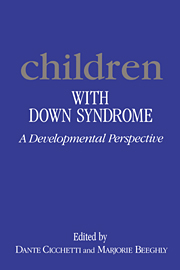Book contents
- Frontmatter
- Contents
- List of contributors
- Preface
- 1 Applying the developmental perspective to individuals with Down syndrome
- 2 An organizational approach to the study of Down syndrome: contributions to an integrative theory of development
- 3 Temperament and Down syndrome
- 4 Interactions between parents and their infants with Down syndrome
- 5 Attention, memory, and perception in infants with Down syndrome: a review and commentary
- 6 Sensorimotor development of infants with Down syndrome
- 7 The growth of self-monitoring among young children with Down syndrome
- 8 Early conceptual development of children with Down syndrome
- 9 Language abilities in children with Down syndrome: evidence for a specific syntactic delay
- 10 Beyond sensorimotor functioning: early communicative and play development of children with Down syndrome
- 11 Peer relations of children with Down syndrome
- 12 Families of children with Down syndrome: ecological contexts and characteristics
- 13 Early intervention from a developmental perspective
- Name index
- Subject index
1 - Applying the developmental perspective to individuals with Down syndrome
Published online by Cambridge University Press: 02 November 2009
- Frontmatter
- Contents
- List of contributors
- Preface
- 1 Applying the developmental perspective to individuals with Down syndrome
- 2 An organizational approach to the study of Down syndrome: contributions to an integrative theory of development
- 3 Temperament and Down syndrome
- 4 Interactions between parents and their infants with Down syndrome
- 5 Attention, memory, and perception in infants with Down syndrome: a review and commentary
- 6 Sensorimotor development of infants with Down syndrome
- 7 The growth of self-monitoring among young children with Down syndrome
- 8 Early conceptual development of children with Down syndrome
- 9 Language abilities in children with Down syndrome: evidence for a specific syntactic delay
- 10 Beyond sensorimotor functioning: early communicative and play development of children with Down syndrome
- 11 Peer relations of children with Down syndrome
- 12 Families of children with Down syndrome: ecological contexts and characteristics
- 13 Early intervention from a developmental perspective
- Name index
- Subject index
Summary
The application of the developmental perspective to atypical populations is characterized by two historical trends. First, the developmental perspective has itself evolved, expanding from its original focus on cognitive and linguistic development to the recent focus on the whole child (Zigler & Hodapp, in press) and the environment in which that child develops (Bronfenbrenner, 1979; Sameroff, 1975). Second, workers have gradually applied the developmental perspective to a wider array of clinical populations (Cicchetti, 1984a). The result is that neither theory nor application has remained static: an expanding theory has increasingly been applied to more varied populations.
In this brief historical review, we attempt to chart trends both in developmental theory and in its application to retarded individuals. After describing the shift from “classical” to “expanded” developmental perspectives, we attempt to show the progression in the application of developmental theory, first to retarded persons not demonstrating organic symptomology (the so-called familial or cultural–familial retarded), later to individuals with Down syndrome and other organic etiologies. Throughout these discussions, we emphasize the strengths and weaknesses of the developmental approach to an understanding of Down syndrome and other retarded individuals.
Classical and expanded developmental perspectives
Classical developmental theory
Any list of developmental theorists must begin with Jean Piaget and Heinz Werner. Even though Piaget is currently undergoing a series of criticisms (e.g., Fischer, 1980; Flavell, 1982), while Werner has experienced a rediscovery by the field (e.g., Wapner & Kaplan, 1983; White, 1984), both are undeniably the developmental theorists par excellence. A brief overview of the basic principles of both men is therefore in order, if only to delimit the proper domain of “developmental psychology” when we later discuss its expanded version.
- Type
- Chapter
- Information
- Children with Down SyndromeA Developmental Perspective, pp. 1 - 28Publisher: Cambridge University PressPrint publication year: 1990
- 28
- Cited by



